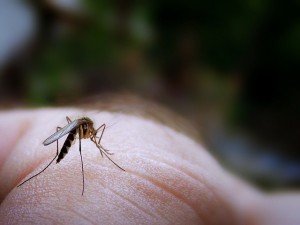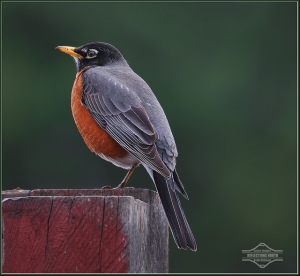W is for West Nile Virus
 1937 Omogo, Uganda (West Nile District) – During research on Yellow Fever, a 37 year old woman is the first known patient to have West Nile Virus (WNV) isolated from her blood.
1937 Omogo, Uganda (West Nile District) – During research on Yellow Fever, a 37 year old woman is the first known patient to have West Nile Virus (WNV) isolated from her blood.
1957 Israel – An outbreak of WNV is shown to produce meningioencephalitis in elderly patients.
1960s – Horses are effected in Egypt, France, and throughout Europe, southwest Asia, and Australia.
1999 College Point, Queens (New York City) – Horses, dogs, cats, and humans infected with WNV
From that initial point of contact in the USA, West Nile Virus, a mosquito-borne arbovirus spread rapidly across the country. Birds, specifically crows and Blue Jays, were found dead throughout the country. Local and state agencies began testing the birds and found West Nile Virus. Surprisingly, as it is a disease of temperate and tropical locations, not what comes to mind when you think of Wisconsin and Minnesota! For many years, the question of how WNV spread so quickly went unanswered. It was well documented that birds are the only species that can build up enough WNV to allow transmission to other species via mosquitoes. Migratory routes and other factors were taken into effect, but it still didn’t make sense. The crows and Blue Jays were dying, so how was the disease still spreading? The culprit was finally found in 2011 – the American Robin.
The American robin has a unique feature in that the mosquitoes that carry WNV love to feed on their blood (I wonder if I am part robin as they appear to feast upon me quite readily as well). The robin is a mainstay in the upper Midwest and has a large migratory pathway. Between the mosquitoes and the robins, they were able to quickly spread across country and since robins weren’t dying from the disease regularly, they were flying under the radar for testing.
Most people that contract WNV never have any symptoms. One in five people will develop flu like symptoms with fever, muscle aches, and lethargy being the biggest signs, and they can hang on for weeks to months, sometimes these may require hospitalization for IV fluids and other medications. Only 1% of all people infected will develop severe disease including meningitis and encephalitis. Of those individuals that develop neurologic signs, 10% will die.
There are no vaccinations for people, although there are WNV vaccines for horses.

How about cats? Can kitties be vaccinated?
LikeLike
Cats can get WNV, but it is not very commonly diagnosed. There is no vaccination for them. Thanks for the question!
LikeLike
I’ll have to hope being indoor cats will keep them safe, then. We’re moving to a tropical country and I do worry about how it will affect their health. They’re my babies. 🙂
LikeLike
Good luck with your move. There are days I would like to live in a tropical country! You may want to consider topical flea medications that also help decrease mosquito issues. Talk to your vet about what would be best for your kitties.
LikeLike
Most people who contract it never have symptoms? Does that mean we could be walking around with it and never know it? Will it just go away eventually?
Stephanie
http://stephie5741.blogspot.com
LikeLike
Yes, that is the case. Without symptoms, the body generally clears it from the system and you are none the wiser. 🙂
LikeLike
Robins?! Wow. I hate mosquitoes. They LOVE me and even if I wear repellent they still feast on me. I always worry about them biting my dogs. They can pass all kinds of things to dogs, right?
LikeLike
Yes, they can. Mosquitoes like to spread heartworm and West Nile Virus among others. I am a mosquito magnet as well. My husband tells me to stand anywhere within a couple feet of him so that they ignore him and feast on me. No fun at all!
LikeLike
I remember West Nile Virus from college. I majored in Zoology. What a strange memory, considering I don’t remember much from back then!.
I’ve recommended your blog in my post for X tomorrow, Melanie!
Thank you for visiting Kim’s guest post on my blog! 🙂
LikeLike
Thank you, Vidya! X has been an interesting decision for me for tomorrow and will be a little bit more difficult for me to write, but I think I am up for the challenge. Zoology an excellent major. I found it interesting as one of my friends majored in zoology and went on to human medical school. I majored in psychology and went on to veterinary medical school. Kim’s post was great. I do love s’mores and spent a lot of time in northern Wisconsin and Duluth, MN when I was in undergrad. Beautiful area of the USA!
LikeLike
Well, that explains it. I AM a Robin, so that must be why mosquitoes zoom in on me. In a crowd of 5,000 people, my dear husband says, they will look around until they find me. Puh. Great article, and applicable here in Indiana for sure. “Our blue jays were decimated, and we are lucky to have two pairs hanging around our place looking healthy and having babies. Well, I think they had babies…
That said, I love your blog!
LikeLike
Thanks for stopping by, loving, and commenting, Robin. It is amazing how WNV has effected the wildlife population, especially birds the last couple of years. Be careful with all the mosquitoes!
LikeLiked by 1 person
That is really interesting, and educating. I have worried about WNV, and other insect and tick born diseases. I think it explains those flu-like symptoms that some people get in the summer.
LikeLike
It certainly is possible. I know I should probably worry more than I do, yet I still forget to put on insect repellant or wear long clothing. Granted, even when I do, they still feast through the clothes and repellant!
LikeLike
Living in south Georgia, not much different from Florida, I keep an eye on reports of WNV. I also have a small dog that I stay up on all his vaccines because of our intense mosquito population. Thanks for the information here. It’s nice to have REAL information instead of the hype the news channels give whenever there’s an outbreak or cases found.
LikeLike
Georgia does have quite the mosquito population! Although vaccines won’t help with WNV and most mosquito infections, I would recommend keeping your pup on appropriate topical flea and tick preventatives, many of them also have some mosquito repellency – K9 Advantix and Activyl are my current favorites for that. I always recommend getting them from a vet clinic though as I have seen fake products online and in stores!
LikeLike
I wasn’t aware that robins were involved in the West Nile cycle. Interesting to learn. Funny, mosquitoes tend to leave me alone, but they love my husband to bits. Poor guy!
Thanks for visiting my site. I appreciate it!
LikeLike
It was some great research that came out a couple of years ago that pinpointed robins as being the perfect reservoir for WNV, it just doesn’t seem to kill them and the specific mosquito finds robins the tastiest. Nature is amazing!
Your site has certainly got my creative juices flowing. Now, what to do with them!?!?!
LikeLike
🙂
LikeLike
Ңi, just wanted tto tell you, I enjoyed this blog post.
Ιt wɑs practical. Keep on posting!
LikeLike